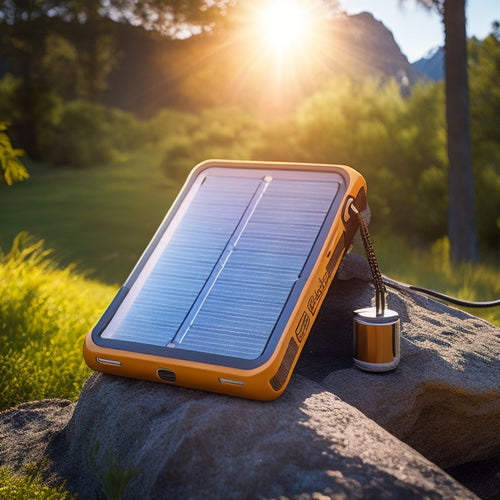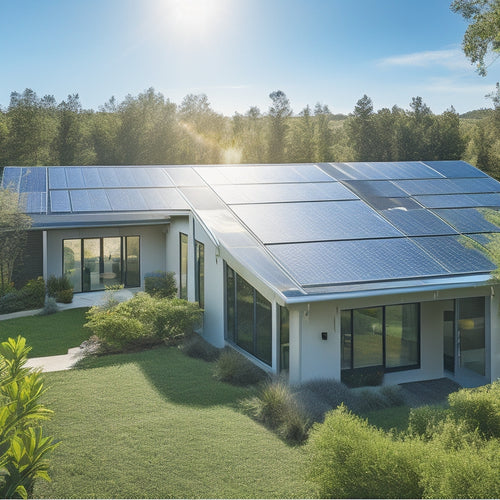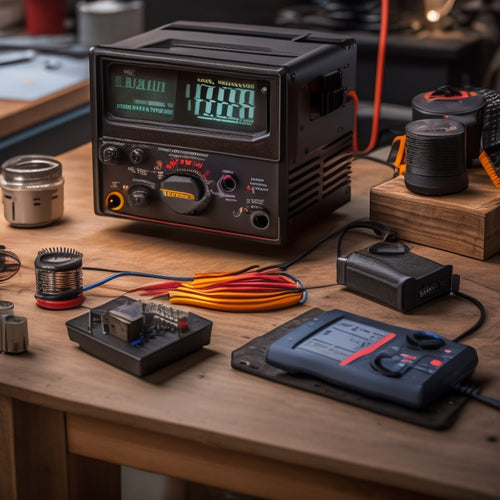
Green Home Security With Renewable Energy Systems
Share
You can increase your home's energy independence and security by integrating renewable energy systems, such as solar power, into your home security setup, reducing reliance on non-renewable energy sources and lowering your energy bills. By considering factors like sensor placement, energy audits, and system scalability, you can optimize your security system's energy efficiency. Next, choose the right solar panels for your needs, and ascertain you have a suitable energy storage solution for nighttime use. Proper integration with existing systems will further enhance your energy independence, and there's more to investigate to maximize the benefits of a green home security system.
Overview
- Opt for solar-powered security systems to reduce reliance on non-renewable energy sources and lower energy bills.
- Conduct energy audits to identify areas for improvement and optimize energy consumption in your security system.
- Select high-efficiency solar panels (>20% efficiency rating) and position them at a 30-40 degree angle facing south for optimal energy generation.
- Choose the right energy storage system, such as lithium-ion batteries, and maintain proper charging cycles to extend battery life.
- Integrate your renewable energy system with smart home technology and existing electrical infrastructure to enhance energy independence and security.
Benefits of Solar Powered Security
Solar panels utilizing the sun's energy can greatly reduce your reliance on non-renewable power sources, and this eco-friendly approach extends to your home security system as well.
By integrating solar power into your security setup, you'll considerably decrease your dependence on the grid, which can lead to lower energy bills and enhanced energy security, especially in rural communities. This means you'll enjoy substantial cost savings on your energy bills, as you'll be utilizing free energy from the sun.
Additionally, solar-powered security systems have a minimal environmental impact, reducing your carbon footprint and contributing to a cleaner, healthier environment.
With solar power, you'll experience increased freedom from reliance on traditional energy sources, allowing you to focus on what matters most - securing your home and family.
Security System Design Considerations
When designing your green home security system, several key factors come into play to guarantee a seamless and effective integration of solar power.
You'll need to evaluate sensor placement, ensuring that motion detectors and cameras are strategically located to maximize coverage while minimizing energy consumption.
To optimize energy efficiency, it's vital to conduct energy audits and identify areas of improvement, such as replacing incandescent bulbs with LEDs.
System scalability is also important, as it allows you to easily add or remove components as your security needs evolve.
Additionally, you should assess your energy requirements and determine the necessary solar panel capacity to support your system.
Choosing the Right Solar Panels
You've taken the first step in designing your green home security system, now it's time to power it with the right solar panels. When selecting solar panels, consider the type: monocrystalline, polycrystalline, or thin-film.
Monocrystalline panels offer high efficiency but are more expensive, while polycrystalline panels provide a balance between efficiency and cost. Thin-film panels are budget-friendly but less efficient.
Look for efficiency ratings above 20% high efficiency ratings to maximize energy generation per sunlight hour, and review warranty options to guarantee thorough coverage. Verify the panels are compatible with your security system's power requirements.
Installation tips include positioning panels at an angle of 30-40 degrees to maximize energy absorption, facing them south to capture direct sunlight, and securing them with sturdy mounting hardware to withstand harsh weather conditions.
Energy Storage for Nighttime Use
Your green home security system relies on a steady flow of energy, even when the sun dips below the horizon. To guarantee continuous power supply, you'll need an energy storage system that can store excess energy generated during the day for nighttime use.
You have several battery types to choose from, including lead-acid, lithium-ion, and nickel-cadmium. Each has its pros and cons, so consider factors like cost, lifespan, and depth of discharge when selecting the right one for your system.
Proper charging cycles are also essential to extend the life of your batteries. Aim for a depth of discharge between 20% and 50% to minimize wear and tear, and consider a charging controller to regulate the flow of energy.
Integration With Existing Systems
Its seamless integration with existing systems is essential to your green home security system's overall performance.
You'll want to verify your renewable energy system integrates with your smart home integration, allowing you to monitor and control your energy usage remotely. This integration also enables you to take advantage of renewable energy incentives, such as net metering and tax credits.
By integrating with your existing electrical infrastructure, you can maximize your energy independence and reduce your reliance on the grid.
Additionally, integration with security systems, such as alarm panels and cameras, provides an added layer of protection for your home.
With a well-integrated system, you'll have complete control and visibility into your energy usage and security, giving you the freedom to live life on your terms.
Frequently Asked Questions
Can Solar-Powered Security Systems Be Used for Commercial Properties?
You can definitely consider solar-powered security systems for your commercial property, as they offer a reliable, cost-effective solution, utilizing solar energy benefits to power advanced commercial security solutions, ensuring freedom from grid dependence and reduced energy costs.
How Do Weather Conditions Affect Solar Panel Performance?
You'll find that weather conditions substantially impact solar panel performance, as cloudy or shady days reduce solar efficiency by up to 25%. Temperature extremes, humidity, and airborne particles also affect output, making it essential to take into account weather impact when optimizing solar energy systems.
Are Solar-Powered Security Systems More Prone to Theft?
You're not a million times more likely to get robbed, but solar-powered security systems do pose a risk. Implementing solar theft prevention measures, like tamper-evident labels and secure mounting, guarantees energy efficiency and protects your investment in freedom-enhancing tech.
Can Homeowners Insure Their Solar-Powered Security Systems?
You can insure your solar-powered security systems, but be aware that insurance coverage may vary depending on policy limitations, such as exclusions for equipment damage or theft, so carefully review your policy to guarantee you're protected.
Do Solar-Powered Security Systems Require Regular Maintenance?
You'll need to perform routine checks on your solar-powered security system, including solar panel cleaning, to verify ideal energy harvesting and extend battery lifespan, thereby guaranteeing reliable protection for your home.
Ready to Buy
You've made it to the final step in creating a green home security system powered by renewable energy. With solar panels generating electricity, energy storage for nighttime use, and seamless integration with existing systems, you'll be sleeping like a baby knowing your home is secure and your carbon footprint is virtually nonexistent. You'll be saving the planet a million times over while keeping your family and possessions safe - it's a win-win!
Related Posts
-

Fastest Solar Chargers for Emergency Power
When choosing the fastest solar chargers for emergency power, you need to focus on features like rapid charging capab...
-

Installing Metal Solar Roofs for Maximum Energy Efficiency
Installing metal solar roofs can drastically enhance your home's energy efficiency and durability. These roofs withst...
-

Key Features of a DC to AC Converter
A DC to AC converter features high efficiency and conversion rates, which reduce energy costs and improve performance...


